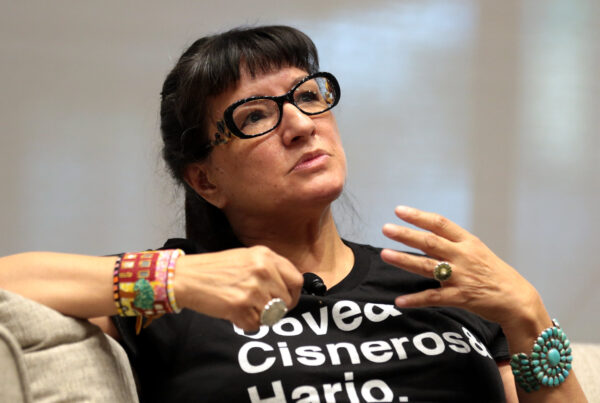From KUT:
There’s no doubt the Republican Party of Texas has changed over the last several decades.
The party the Bush family embraced and helped build in the ’80s and ’90s has now become a place where the Bushes are considered passé. To many, the dynasty took its final breath in 2022, when Texas Republican voters rejected George P. Bush’s primary bid for attorney general.
More recently, the party has been engulfed in controversy and infighting — from spats over Attorney General Ken Paxton’s impeachment to ties to white supremacists.
So, how did we get here?
The shift was long and complicated, so let’s start in the more recent past: In 2012, when former Texas Gov. Rick Perry was vying to be the Republican Party’s nominee for president.
The Republican Party of Texas from the 2000s to today
On the campaign trail in 2012, Perry touted his border bona fides, citing things like Texas’ increased spending on border security during his governorship. But Perry also had to defend a bill he’d signed years earlier — one that allowed undocumented students to attend Texas public universities or colleges at in-state tuition rates.
“If you say we should not educate children who have come into our state for no other reason than they’ve been brought there by no fault of their own, I don’t think you have a heart,” Perry said during a 2012 primary debate in Orlando, Fla.

When then-Texas Gov. Rick Perry, seen in 2014, ran for president he had to defend a bill allowing undocumented students to attend state universities or colleges at an in-state tuition rate.
Jorge Sanhueza-Lyon / KUT News
In 2001, when the measure passed, the political makeup of the state looked very different. The Texas House was led by Democrats, including a Democratic speaker.
Still, at the time, the state’s Republicans overwhelmingly supported the legislation. It passed on a final vote of 142-1.
Just the next year, in 2002, Republicans won control of the Texas House, the first time since the Reconstruction era.
The party’s dominance has only expanded since then. Today, Republicans hold majorities in both chambers. And as the party grew in power, it also moved further to the right.
So much so that a bill like the one Perry defended would be dead on arrival.
The idea of it makes Matt Rinaldi, the chairman of the Republican Party of Texas, laugh.
“That was a very bad idea,” he told The Texas Newsroom in a recent interview.
Rinaldi assumed the head of the party in 2021 and has been pushing the party in a different direction — one that has increased its control of state government, but also alienated or pushed out some longtime Texas conservatives.
Rinaldi said his vision for the future would make the party even more influential in a state where Republicans continue to win up and down the ballot, and Democrats seem to have a hard time even registering new voters.
Cracks in the armor
One of the biggest changes for the Republican Party of Texas has been in how it behaves as an institution.
“The party 10 years ago was effectively a cheerleading society for Republican-elected officials. It didn’t take positions on tough issues for fear that they might offend some of those elected officials,” Rinaldi said. “And my question always was, ‘Why?’”
Shifting away from that previous role is one of Rinaldi’s biggest priorities for the Texas GOP. And Rinaldi is not shy about going after Republicans he disagrees with.
Rinaldi has criticized and campaigned against House Speaker Dade Phelan for allowing Paxton’s impeachment to move forward.
On Saturday, the Texas GOP’s State Republican Executive Committee went one step further: They voted to censure Phelan over the Paxton saga and for appointing Democratic lawmakers to chair House committees.
Cait Wittman, Phelan’s spokesperson, on Saturday blasted the latest Texas GOP move in a post on X shortly afterward.
“This is the same organization that rolled out the red carpet for a group of Neo-Nazis, refused to disassociate from anti-Semitic groups and balked at formally condemning a known sexual predator before he was ousted from the Texas House,” Wittman said. “The SREC has lost its moral authority and is no longer representative of the views of the Party as a whole.”
Rinaldi has also targeted Republicans who don’t support school vouchers, one of Gov. Greg Abbott’s recent legislative priorities.
“You have the brand that those elected officials depend on in order to get elected,” he said. “You should exert some of the leverage you have to make sure that the government operates under the principles and values that your members share.”
The immigration agenda
But some stances taken by Rinaldi — and the Texas GOP under his leadership — are hard to swallow for Republicans who have been working to make the party more inclusive.
Take immigration, for instance.
Last year, the GOP-led Texas Legislature passed a mix of bills that supporters say will help curtail and deter illegal migration.
One of the new laws created a new state crime for entering the country without permission. Subsequent violations could result in a penalty increase.
Under state law, local and state enforcement agents can stop whoever they suspect of being in the country illegally. It also allows magistrate judges to return migrants to Mexico. The measure could go into effect next March if it’s not delayed by ongoing legal challenges.
Artemio Muniz, the founder of the Texas Federation of Hispanic Republicans, said the messaging his fellow Republicans are pushing around immigration makes it hard to recruit new voters.
“How am I as a Republican — how am I going to do outreach if the majority of people I know have family or neighbors or fellow church members that are illegal immigrants, and have been here for years working in construction, hotels, restaurants?” Muniz said. “It doesn’t make sense — Nobody is going to support a party that is pushing to deport their friends and family.”
Muniz said he understands there needs to be action at the border, but said the rhetoriccoming from Abbott and other Republicans in the state put migrants in a “dangerous position.”
He said he also takes issue with the Texas GOP associating with racists.
“You would think that these guys that have been to every meeting, at every seminar possible on growing the party, would understand that they should be focused on growing the party in the Hispanic community,” Muniz said. “Instead, they’re meeting with, you know, white nationalist type figures. So what’s going on here? It’s just incompetence.”
Muniz’s is referring to the fierce backlash the Texas GOP faced last fall, when it refused to cut ties with a Defend Texas Liberty, a conservative political action committee that hosted white supremacist Nick Fuentes at its office.
Rinaldi told The Texas Newsroom the Fuentes controversy was nonsense.
“There was somebody who had a stupid meeting and a bunch of political opportunists who want the party to go back to being what it was 10 years ago, who are trying to pounce on that one completely boneheaded move that one employee of a PAC did, in order to make an issue that isn’t there,” Rinaldi said.
But Muniz doesn’t see it that way.
“The problem is these guys like Matt Rinaldi and some of these, you know … these guys, forget that whenever you take action, you represent the entire body of the Republican Party,” Muniz said. “It’s an umbrella.”
Muniz said the party used to be better at courting Hispanic voters.
In fact, his Hispanic Republican group left the Texas GOP nearly a decade ago over the Party’s anti-immigration position, including its support for policies Muniz says would create defacto mass deportations.
And while the party is still trying to flip some Democratic seats along the border, Muniz says recent actions show the state’s Republican party has been focusing on the wrong issues and messaging — something he calls “dinosaur politics.”
Others are more blunt.
Former GOP state Rep. Burt Solomons served in the Texas House for 18 years — From 1995 to 2013.
“We didn’t have the culture wars,” Solomons said, referring to Republicans going after issues such as diversity, equity and inclusion; gender-affirming care; and drag performances.
Solomons said the Republican Party has become a “cult” — both in Texas and elsewhere.
“It slowly went away from a lot of those traditional values of the Republican Party which were low taxes, local control, trying to have reasonably drafted legislation from the conservative point of view,” Solomons said.
Solomons told The Texas Newsroom he no longer considers himself a Republican.
But the state party Chairman Rinaldi isn’t phased by the critics.
“Again, it’s people trying to find any way to attack the party because the party is more influential than it ever has been before,” he said. “Some people don’t want that, like Bert Solomons.”
Another reflection of the divisions within the party: Rinaldi is being challenged for his leadership role by Dana Myers, the Republican Party of Texas’ current vice chair.
Myers didn’t respond to a request for comment for this story. She has, however, said the state GOP is in an untenable situation because “we find ourselves in a state of disarray, fractured by internal divisions and marred by turmoil.”













